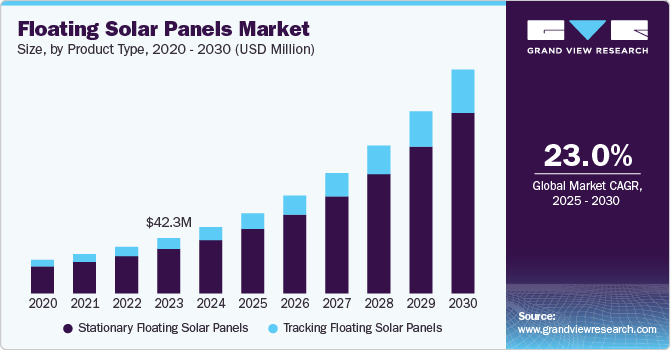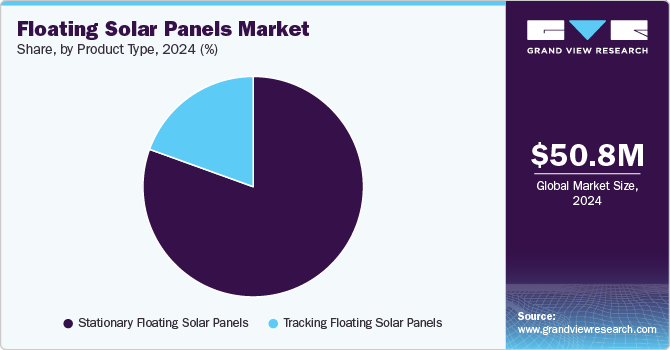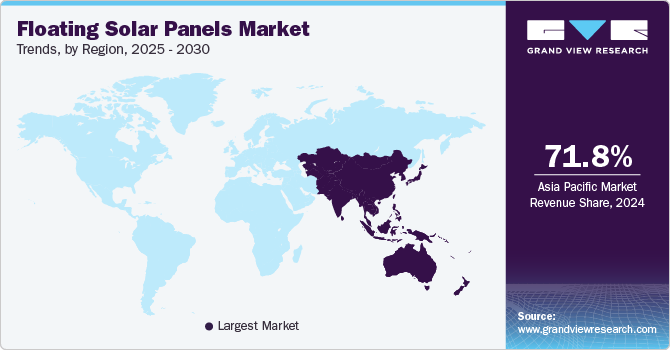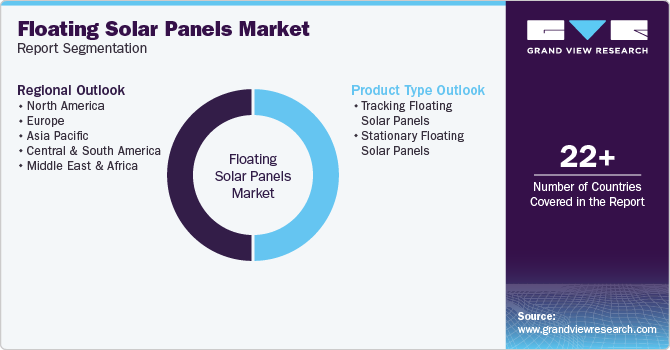- Home
- »
- Renewable Energy
- »
-
Floating Solar Panels Market Size And Share Report, 2030GVR Report cover
![Floating Solar Panels Market Size, Share & Trends Report]()
Floating Solar Panels Market (2025 - 2030) Size, Share & Trends Analysis Report By Product Type (Tracking Floating Solar Panels, Stationary Floating Solar Panels), By Region, And Segment Forecasts
- Report ID: GVR-1-68038-354-6
- Number of Report Pages: 110
- Format: PDF
- Historical Range: 2018 - 2023
- Forecast Period: 2025 - 2030
- Industry: Energy & Power
- Report Summary
- Table of Contents
- Segmentation
- Methodology
- Download FREE Sample
-
Download Sample Report
Floating Solar Panels Market Summary
The global floating solar panels market size was estimated at USD 50.82 million in 2024 and is projected to reach USD 172.90 million by 2030, growing at a CAGR of 23.0% from 2025 to 2030. Increasing focus on clean fuel power generation energy sources coupled with insufficiency of land area will boost the global market size during the projection period.
Key Market Trends & Insights
- Asia Pacific dominated the floating solar panels market with largest revenue share of 71.76% in 2024.
- The floating solar panel market in China is anticipated to grow at the fastest CAGR during the forecast period.
- Based on product type, the stationery floating solar panels segment led the market with the largest revenue share of 80.51% in 2024.
Market Size & Forecast
- 2024 Market Size: USD 50.82 Million
- 2030 Projected Market Size: USD 172.90 Million
- CAGR (2025-2030): 23.0%
- Asia Pacific: Largest Market in 2024
Regulatory boards across the world are setting up several targets related to clean energy, which will help to control the pollution level. The technical aspect of floating solar technology is projected to observe substantial growth over the estimated period owed to the growing demand for dependable renewable sources of energy for power generation. The market is experiencing rapid growth, driven by the increasing demand for renewable energy and innovative solutions to land scarcity. Floating solar, also known as "floatovoltaics," has become a viable alternative to traditional land-based installations, especially in regions where land costs are high, or space is limited. This trend is particularly strong in countries like Japan, China, and India, where bodies of water, such as reservoirs and lakes, are used to deploy floating solar farms. In addition, the integration of floating solar with other sustainable practices, like hydropower or water management systems, is gaining traction, further boosting the adoption of this technology.
Drivers, Opportunities & Restraints
A key driver of the market is the push for renewable energy to meet global carbon reduction targets. Governments worldwide are implementing policies and offering incentives to promote clean energy sources, and floating solar panels provide a way to meet these goals without taking up valuable land. The technology is particularly attractive in densely populated areas and regions with limited land availability, as it helps solve the challenge of competing land use. In addition, floating solar panels benefit from cooler temperatures on water surfaces, improving efficiency compared to traditional solar installations.
The untapped potential of large water bodies presents a significant opportunity for the market growth. Countries with abundant lakes, reservoirs, and dams can leverage these spaces to expand their renewable energy capacity without impacting agriculture or urban development. Furthermore, floating solar installations can reduce water evaporation in arid regions, creating synergies with water conservation efforts. Emerging markets in Southeast Asia, Africa, and South America, where energy demand is rising and land availability is constrained, offer substantial growth potential for floating solar projects in the coming years.
Despite its benefits, the market faces challenges related to the higher upfront costs of installation and maintenance. The need for specialized anchoring systems, materials that can withstand water exposure, and additional logistical complexities can make these projects more expensive than traditional solar farms. Moreover, environmental concerns, such as potential impacts on aquatic ecosystems and water quality, are significant barriers in some regions, where regulatory scrutiny may delay or increase the costs of deployment. These factors can slow the adoption rate, especially in regions with limited financial resources or technical expertise.
Product Type Insights
The stationery floating solar panels segment led the market with the largest revenue share of 80.51% in 2024.Stationary floating solar panels can be deployed easily on a body of water such as a reservoir or a lake. Stationary floating solar panels also double as shades for the water body which reduce evaporation of water. Due to the use of low-cost, high-strength elastic in the construction of the panels, the cost of installing a stationary floating solar panel is cheaper than that of installing a tracking floating solar panel. Growing expenditures in the manufacturing and installation of solar panels in developing countries are expected to enhance demand in the coming years due to the stable, lasting, and dependable nature of solar tracking technology with lower maintenance costs. Tracking solar panels are very competitive due to their ability to follow the sun, increasing the system's operating output.
Due to its higher operational productivity, tracking solar technology is projected to gain traction in floating solar farms, which will have a beneficial impact on demand. However, due to its moving elements, tracking solar panels requires more maintenance than fixed floating solar panel farms, which is expected to slow segment growth in the coming years.

The tracking floating solar panels segment is anticipated to grow at a substantial CAGR over the forecast period. Solar tracking technology is more efficient as compared to its counterpart; stationery panels are preferred over solar tracking panels owing to the high cost associated with the product. However, the growing research & development investments by the panel manufacturers are expected to bring down the maintenance cost, which in turn is expected to drive market growth over the next nine years. The solar tracking technology is expected to grow faster as compared to its counterpart in developed economies on account of high-performance efficiency.
Regional Insights
The floating solar panels market in North America is anticipated to grow at a CAGR during the forecast period. The growing focus on sustainability and decarbonization is a key driver for the market. Many states and provinces are setting aggressive renewable energy goals, creating opportunities for floating solar to be integrated into existing energy grids. This is particularly appealing in regions with agricultural and water management challenges, where floating solar can reduce water evaporation and improve water quality.
U.S. Floating Solar Panels Market Trends
The floating solar panels market in the U.S. is driven by a combination of federal and state-level renewable energy mandates and a growing interest in optimizing underutilized water bodies for energy generation. Several states, particularly California and Florida, are exploring floating solar to address land-use conflicts, water management challenges, and rising energy demands. Floating solar also fits well with the U.S. focus on grid modernization and energy storage solutions, making it an attractive option for utilities looking to enhance energy resilience and reduce carbon emissions. Federal incentives and clean energy investment initiatives continue to push the market forward.
Asia Pacific Floating Solar Panels Market Trends
Asia Pacific dominated the floating solar panels market with largest revenue share of 71.76% in 2024.In Japan, the level of penetration of floating solar panels is high due to its less availability of land tied to limited amount of fossil fuels. As a result, the government has authorized several plans for floating panels to meet the growing electricity consumption with lesser damage to the environment. In the APAC region, the penetration of the floating solar technology is expected to surge owing to its high market potential. Besides, a decrease in solar panel cost in the region coupled with growing awareness of floating solar technology is anticipated to endorse growth over the upcoming years. For instance, in 2018, KYOCERA Corporation of Japan started its operation at Japan’s largest 13.7 MW floating solar panel plant.

The floating solar panel market in China is anticipated to grow at the fastest CAGR during the forecast period. China, the world’s largest solar power producer, is driving the market growth through strong government support and its commitment to achieving carbon neutrality by 2060. With vast water resources, including artificial reservoirs and water bodies created by mining activities, China has embraced floating solar as a solution to reduce air pollution and diversify its renewable energy sources. The country's ambitious renewable energy policies and large-scale investment in solar power infrastructure, coupled with technological advancements and lower manufacturing costs, are fueling the rapid deployment of floating solar farms. China's state-backed initiatives to integrate floating solar with other energy and water management systems further boost the market’s growth.
Europe Floating Solar Panels Market Trends
The floating solar panel market in Europe is anticipated to grow at the fastest CAGR during the forecast period. The region's focus on innovative renewable energy solutions aligns with floating solar technology, especially in countries like the Netherlands and the UK, where land is scarce. Europe’s regulatory framework favors clean energy adoption, with numerous funds and grants available for renewable projects.
Key Floating Solar Panels Company Insights
The market is highly competitive, with several key players dominating the landscape. Major companies include KYOCERA Corporation; Trina Solar, Yellow Tropus Pvt. Ltd; Wuxi Suntech Power Co., Ltd.; Yingli Solar; Ciel & Terre international; LONGi Solar; JA SOLAR Technology Co. Ltd.; Hanwha Group; Vikram Solar Limited; GCL-SI; Talesun; Pristine Sun Corp; Sharp Corporation. The market is characterized by a competitive landscape with several key players driving innovation and market growth. Major companies in this sector are investing heavily in research and development to enhance the performance, cost-effectiveness, and sustainability of their product.
Key Floating Solar Panels Companies:
The following are the leading companies in the floating solar panels market. These companies collectively hold the largest market share and dictate industry trends.
- KYOCERA Corporation
- Trina Solar
- Yellow Tropus Pvt. Ltd
- Wuxi Suntech Power Co., Ltd.
- Yingli Solar
- Ciel & Terre International
- LONGi Solar
- JA SOLAR Technology Co. Ltd.
- Hanwha Group
- Vikram Solar Limited
- GCL-SI; Talesun
- Pristine Sun Corp
- Sharp Corporation
- ITOCHU Corporation
Recent Developments
-
In August 2024, the Electricity Generating Authority of Thailand (EGAT) has announced the start of commercial operations for a hybrid hydro-floating solar power project at the Ubol Ratana Dam. This innovative project combines hydroelectric power with floating solar panels, aiming to enhance energy efficiency and sustainability. The initiative is expected to contribute significantly to Thailand's renewable energy goals by increasing electricity generation while minimizing land use.
-
In March 2024, the Solar Energy Corporation of India (SECI) has selected Larsen and Toubro Ltd (L&T) as the lowest bidder for a 100 MW floating solar project in Jharkhand, specifically at Getalsud Dam in Ranchi. L&T will handle the entire process, which includes the design, engineering, supply, construction, and commissioning of the solar plant, along with five years of operations and maintenance. The project is expected to be completed within 12 months, with a total contract value of INR 606.14 crore (approximately USD 73.24 million) for both the construction and maintenance phases.
Floating Solar Panels Market Report Scope
Report Attribute
Details
Market size value in 2025
USD 61.49 million
Revenue forecast in 2030
USD 172.90 million
Growth rate
CAGR of 23.0% from 2025 to 2030
Base year for estimation
2024
Historical data
2018 - 2023
Forecast period
2025 - 2030
Quantitative units
Revenue in USD million/billion, Capacity in MW, and CAGR from 2025 to 2030
Report coverage
Revenue forecast, competitive landscape, growth factors, and trends
Segments covered
Product type, region
Regional scope
North America; Europe; Asia Pacific; Latin America; Middle East & Africa
Country scope
U.S.; India; Japan; South Korea; China
Key companies profiled
KYOCERA Corporation; Trina Solar; Yellow Tropus Pvt. Ltd; Wuxi Suntech Power Co., Ltd.; Yingli Solar; Ciel & Terre International; LONGi Solar; JA SOLAR Technology Co. Ltd.; Hanwha Group; Vikram Solar Limited; GCL-SI; Talesun; Pristine Sun Corp; Sharp Corporation; ITOCHU Corporation
Customization scope
Free report customization (equivalent up to 8 analyst’s working days) with purchase. Addition or alteration to country, regional & segment scope
Pricing and purchase options
Avail customized purchase options to meet your exact research needs. Explore purchase options
Global Floating Solar Panels Market Report Segmentation
This report forecasts revenue growth at global, regional, and country levels and provides an analysis of the latest industry trends in each of the sub-segments from 2018 to 2030. For this study, Grand View Research has segmented the global floating solar panels market report based on the product type, and region:

-
Product Type Outlook (Capacity, MW; Revenue, USD Million, 2018 - 2030)
-
Tracking Floating Solar Panels
-
Stationary Floating Solar Panels
-
-
Regional Outlook (Capacity, MW; Revenue, USD Million, 2018 - 2030)
-
North America
-
U.S.
-
-
Europe
-
Asia Pacific
-
China
-
India
-
Japan
-
South Korea
-
-
Central and South America
-
Middle East and Africa
-
Frequently Asked Questions About This Report
b. The global floating solar panels market size was estimated at USD 50.82 million in 2024 and is expected to reach USD 61.49 million in 2025.
b. The global floating solar panels market is expected to witness a compound annual growth rate of 23.0% from 2025 to 2030 to reach USD 172.90 million by 2030.
b. In 2024, the Asia Pacific region accounted for the largest revenue market share of more than 71% of the global floating solar panels industry. In Japan, the level of penetration of floating solar panels is high due to its less availability of land tied to the limited amount of fossil fuels. As a result, the government has authorized several plans for floating panels to meet the growing electricity consumption with lesser damage to the environment.
b. Some key players operating in the floating solar panels market include KYOCERA Corporation; Trina Solar; Yellow Tropus Pvt. Ltd; Wuxi Suntech Power Co., Ltd.; Yingli Solar; Ciel & Terre International; LONGi Solar; JA SOLAR Technology Co. Ltd.; Hanwha Group; Vikram Solar Limited; GCL-SI; Talesun; Pristine Sun Corp; Sharp Corporation; ITOCHU Corporation
b. Increasing focus on clean fuel power generation energy sources coupled with insufficiency of the land area will boost the global floating solar panels market size during the projection period.
Share this report with your colleague or friend.
Need a Tailored Report?
Customize this report to your needs — add regions, segments, or data points, with 20% free customization.

ISO 9001:2015 & 27001:2022 Certified
We are GDPR and CCPA compliant! Your transaction & personal information is safe and secure. For more details, please read our privacy policy.
Trusted market insights - try a free sample
See how our reports are structured and why industry leaders rely on Grand View Research. Get a free sample or ask us to tailor this report to your needs.










